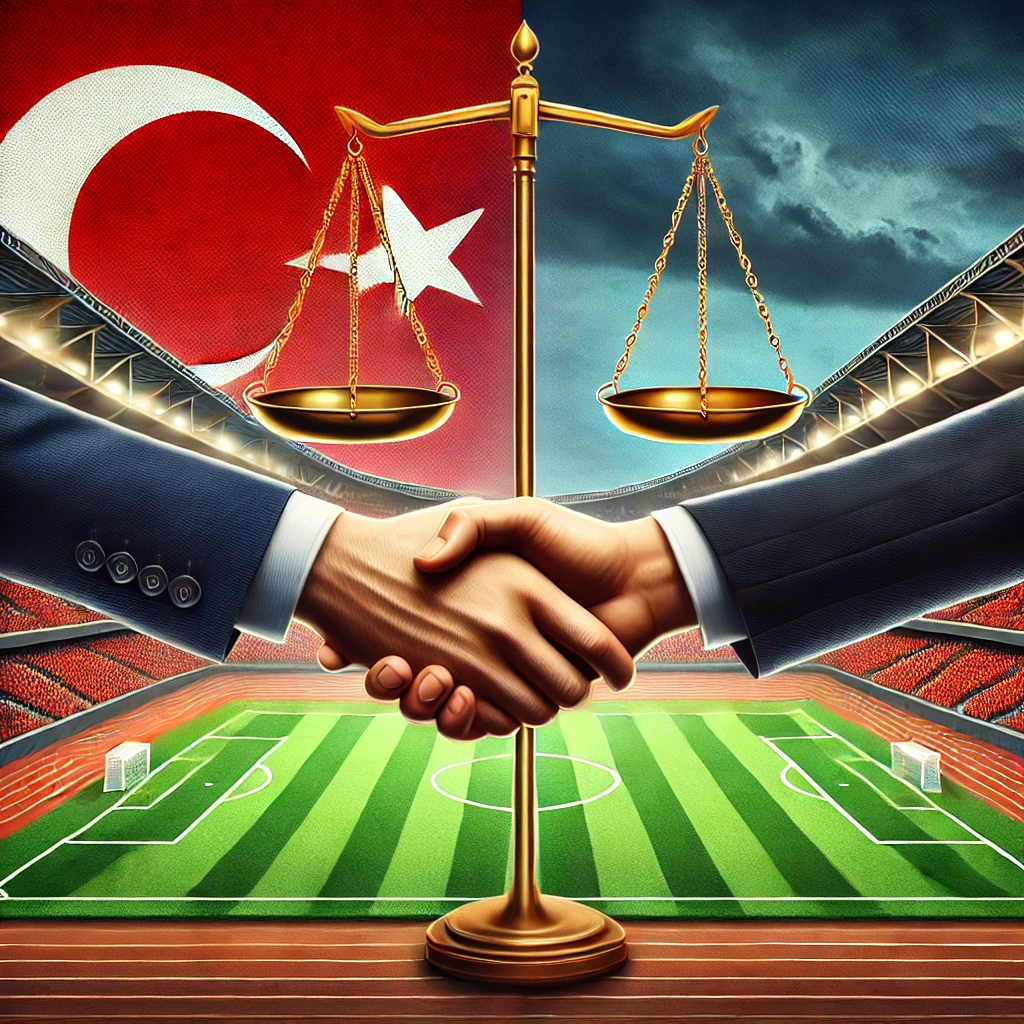Introduction
The globalization of sports has brought foreign athletes into the rosters of Turkish sports clubs, enhancing the competitiveness and appeal of Turkish leagues. However, the relationship between clubs and foreign athletes can sometimes lead to legal disputes over issues such as contract breaches, unpaid wages, or disciplinary actions. This article examines the legal framework governing disputes between sports clubs and foreign athletes in Turkey and outlines practical solutions for effective dispute resolution.
1. Legal Framework Governing Sports Disputes in Turkey
Turkey’s legal system offers several mechanisms for resolving disputes between sports clubs and athletes. These mechanisms are grounded in national laws, international agreements, and specialized sports arbitration systems.
1.1. Key National Regulations
- Turkish Code of Obligations (Law No. 6098): Governs contractual relationships, including those between sports clubs and athletes.
- Turkish Labor Law (Law No. 4857): Applies to employment-related disputes, such as unpaid wages or unfair termination.
- Regulations of the Turkish Football Federation (TFF): Include specific provisions for resolving disputes within Turkish football.
1.2. International Legal Framework
- FIFA Dispute Resolution Chamber (DRC): Handles disputes related to international transfers, unpaid wages, and contractual stability.
- Court of Arbitration for Sport (CAS): Provides an independent platform for resolving high-profile sports disputes.
2. Common Disputes Between Sports Clubs and Foreign Athletes
2.1. Contractual Breaches
- Failure to honor contractual terms, such as payment delays or non-payment of wages and bonuses.
- Early termination of contracts by clubs without just cause.
2.2. Transfer Disputes
- Disputes over transfer fees, agent commissions, or compliance with FIFA’s transfer regulations.
2.3. Disciplinary Actions
- Clubs imposing fines or suspensions for alleged breaches of discipline without providing due process.
2.4. Employment Disputes
- Lack of clarity regarding the legal status of foreign athletes (employee vs. independent contractor).
3. Dispute Resolution Mechanisms
Turkey offers both domestic and international avenues for resolving disputes between sports clubs and foreign athletes.
3.1. Domestic Mechanisms
- Arbitration Committees of Sports Federations: Handle disputes under the jurisdiction of Turkish sports bodies, such as the TFF.
- Labor Courts: Address employment-related disputes if the athlete is classified as an employee under Turkish law.
3.2. International Mechanisms
- FIFA Dispute Resolution Chamber (DRC): Provides a faster resolution for disputes involving international transfers or contractual breaches.
- Court of Arbitration for Sport (CAS): Offers binding arbitration for appeals against decisions made by FIFA or Turkish sports federations.
3.3. Mediation
- Mediation is increasingly being used as a cost-effective and less adversarial means of resolving disputes, particularly for contractual disagreements.
4. Challenges in Resolving Disputes
4.1. Jurisdictional Conflicts
- Disputes involving foreign athletes often raise questions about whether Turkish courts, sports arbitration committees, or international bodies have jurisdiction.
4.2. Enforcement of Awards
- Enforcing arbitration awards, particularly those issued by international bodies like CAS, can be challenging in Turkey if they conflict with public policy.
4.3. Language and Cultural Barriers
- Foreign athletes may face difficulties understanding Turkish legal procedures and language, leading to delays in dispute resolution.
5. Recommendations for Effective Dispute Resolution
5.1. Draft Comprehensive Contracts
- Clearly define terms related to wages, bonuses, termination, and dispute resolution clauses in contracts.
- Include arbitration clauses specifying the preferred forum (e.g., CAS or FIFA DRC).
5.2. Utilize Mediation
- Encourage mediation as the first step in dispute resolution to save time and maintain professional relationships.
5.3. Provide Legal Assistance
- Ensure that foreign athletes have access to legal counsel familiar with both Turkish and international sports law.
5.4. Improve Transparency in Disciplinary Processes
- Establish clear guidelines and due process for imposing fines or suspensions on athletes.
6. Case Studies
6.1. FIFA DRC Rulings
- Highlight cases where foreign athletes successfully claimed unpaid wages or compensation for unjust termination.
6.2. CAS Appeals
- Discuss instances where decisions by Turkish sports bodies were appealed and overturned by CAS.
7. Opportunities for Legal Reform
- Standardized Contracts: Introduce model contracts for foreign athletes that comply with Turkish law and FIFA regulations.
- Independent Arbitration Bodies: Establish independent sports arbitration panels in Turkey to handle disputes more efficiently.
- Training Programs: Offer legal education programs for clubs and athletes on their rights and obligations.
Conclusion
Disputes between sports clubs and foreign athletes in Turkey require careful navigation of domestic and international legal frameworks. By adopting proactive measures such as drafting comprehensive contracts, leveraging mediation, and improving access to legal resources, both parties can minimize conflicts and resolve disputes more effectively. Strengthening Turkey’s dispute resolution mechanisms will not only benefit athletes and clubs but also enhance the country’s reputation as a global sports hub.

Yanıt yok